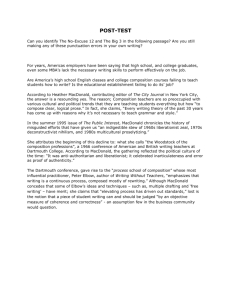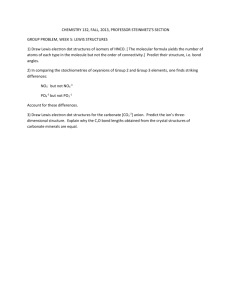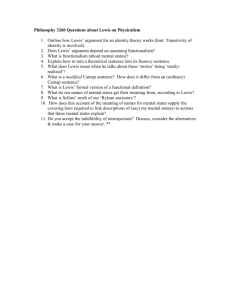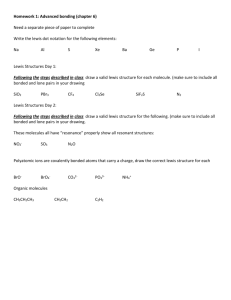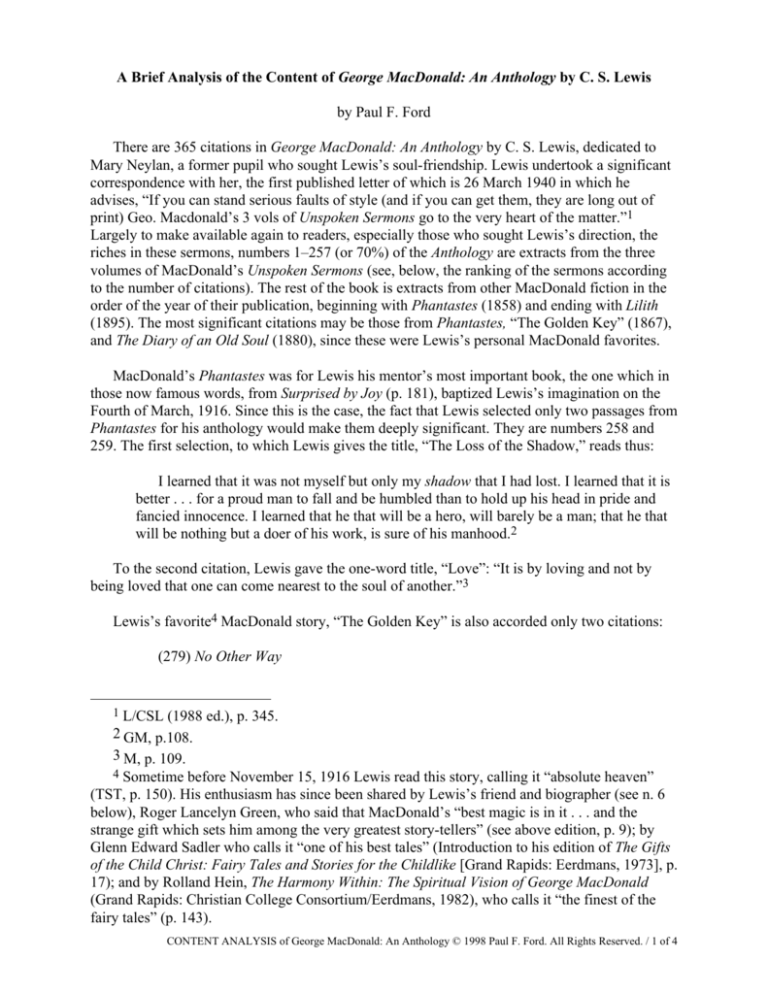
A Brief Analysis of the Content of George MacDonald: An Anthology by C. S. Lewis
by Paul F. Ford
There are 365 citations in George MacDonald: An Anthology by C. S. Lewis, dedicated to
Mary Neylan, a former pupil who sought Lewis’s soul-friendship. Lewis undertook a significant
correspondence with her, the first published letter of which is 26 March 1940 in which he
advises, “If you can stand serious faults of style (and if you can get them, they are long out of
print) Geo. Macdonald’s 3 vols of Unspoken Sermons go to the very heart of the matter.”1
Largely to make available again to readers, especially those who sought Lewis’s direction, the
riches in these sermons, numbers 1–257 (or 70%) of the Anthology are extracts from the three
volumes of MacDonald’s Unspoken Sermons (see, below, the ranking of the sermons according
to the number of citations). The rest of the book is extracts from other MacDonald fiction in the
order of the year of their publication, beginning with Phantastes (1858) and ending with Lilith
(1895). The most significant citations may be those from Phantastes, “The Golden Key” (1867),
and The Diary of an Old Soul (1880), since these were Lewis’s personal MacDonald favorites.
MacDonald’s Phantastes was for Lewis his mentor’s most important book, the one which in
those now famous words, from Surprised by Joy (p. 181), baptized Lewis’s imagination on the
Fourth of March, 1916. Since this is the case, the fact that Lewis selected only two passages from
Phantastes for his anthology would make them deeply significant. They are numbers 258 and
259. The first selection, to which Lewis gives the title, “The Loss of the Shadow,” reads thus:
I learned that it was not myself but only my shadow that I had lost. I learned that it is
better . . . for a proud man to fall and be humbled than to hold up his head in pride and
fancied innocence. I learned that he that will be a hero, will barely be a man; that he that
will be nothing but a doer of his work, is sure of his manhood.2
To the second citation, Lewis gave the one-word title, “Love”: “It is by loving and not by
being loved that one can come nearest to the soul of another.”3
Lewis’s favorite4 MacDonald story, “The Golden Key” is also accorded only two citations:
(279) No Other Way
1 L/CSL
(1988 ed.), p. 345.
2 GM, p.108.
3 M, p. 109.
4 Sometime before November 15, 1916 Lewis read this story, calling it “absolute heaven”
(TST, p. 150). His enthusiasm has since been shared by Lewis’s friend and biographer (see n. 6
below), Roger Lancelyn Green, who said that MacDonald’s “best magic is in it . . . and the
strange gift which sets him among the very greatest story-tellers” (see above edition, p. 9); by
Glenn Edward Sadler who calls it “one of his best tales” (Introduction to his edition of The Gifts
of the Child Christ: Fairy Tales and Stories for the Childlike [Grand Rapids: Eerdmans, 1973], p.
17); and by Rolland Hein, The Harmony Within: The Spiritual Vision of George MacDonald
(Grand Rapids: Christian College Consortium/Eerdmans, 1982), who calls it “the finest of the
fairy tales” (p. 143).
CONTENT ANALYSIS of George MacDonald: An Anthology © 1998 Paul F. Ford. All Rights Reserved. / 1 of 4
The Old Man of the Earth stooped over the floor of the cave, raised a huge stone, and
left it leaning. It disclosed a great hole that went plumb-down. “That is the way,” he said.
“But there are no stairs. You must throw yourself in. There is no other way.
(280) Death
“You have tasted of death now,” said the Old Man. “Is it good?” “It is good,” said
Mossy. “It is better than life.” “No,” said the Old Man. “it is only more life.”
In the crucial period of Lewis’s life, between the time he had become a theist but not yet a
Christian, Lewis began reading The Diary of an Old Soul sometime before October 1929 because
he says to Greeves in a letter of October 10th that he has been “slowly reading . . . MacDonald’s
Diary of an Old Soul. . . . I strongly advise you to try it. He seems to know everything and I find
my own experience in it constantly . . . There is a delicious home-spun, earthy flavour about it,
as in George Herbert. Indeed for me he is better than Herbert.”5 Even in term-time Lewis could
write to his friend Greeves:
All private reading has ceased, except for 20 minutes before bed . . . when I drink a cup
of cocoa and try to wash the day off with MacDonalds [sic] Diary of an Old Soul. I shall
soon have finished it and must look round for another book. Luckily the world is full of
books of that general type: that is another of the beauties of coming, I won’t say, to
religion but to an attempt at religion—one finds oneself on the main road with all
humanity, and can compare notes with an endless succession of previous travellers. It is
emphatically coming home: as Chaucer says ‘Returneth home from worldly vanitiee.’6
This is accorded eight citations:
(333) Preacher’s Repentance
O Lord, I have been talking to the people;
Thought’s wheels have round me whirled a fiery zone,
And the recoil of my word’s airy ripple
My heart heedful has puffed up and blown.
Therefore I cast myself before thee prone:
Lay cool hands on my burning brain and press
From my weak heart the swelling emptiness.
(334) Deeds
I would go near thee—but I cannot press
Into thy presence—it helps not to presume.
Thy doors are deeds.
(335) Prayer
My prayers, my God, flow from what I am not;
5 TST,
p. 313.
6 TST, pp. 333–334 (January 26, 1930); see also pp. 314 and 403.
CONTENT ANALYSIS of George MacDonald: An Anthology © 1998 Paul F. Ford. All Rights Reserved. / 2 of 4
I think thy answers make me what I am.
Like weary waves thought follows upon thought,
But the still depth beneath is all thine own,
And there thou mov’st in paths to us unknown.
Out of strange strife thy peace is strangely wrought;
If the lion in us pray—thou answerest the lamb.
(336) The House Is Not for Me
The house is not for me—it is for Him.
His royal thoughts require many a stair,
Many a tower, many an outlook fair
Of which I have no thought.
(337) Hoarding
In holy things may be unholy greed.
Thou giv’st a glimpse of many a lovely thing
Not to be stored for use in any mind,
But only for the present spiritual need.
The holiest bread, if hoarded, soon will breed
The mammon-moth, the having pride. . . .
(338) The Day’s First Job
With every morn my life afresh must break
The crust of self, gathered about me fresh.
(339) Obstinate Illusion
Have pity on us for the look of things,
When blank denial states us in the face.
Although the serpent mask have lied before
It fascinates the bird.
(340) The Rules of Conversation
Only no word of mine must ever foster
The self that in a brother’s bosom gnaws;
I may not fondle failing, nor the boaster
Encourage with the breath of my applause.
The following is a ranking (RANK) of the sermons according to the number of citations
(NUMBER) made by Lewis in his anthology:
RANK
NUMBER
SERMON TITLE(S)
1
2
16
15
“The Truth”
“Life,” “Righteousness”
CONTENT ANALYSIS of George MacDonald: An Anthology © 1998 Paul F. Ford. All Rights Reserved. / 3 of 4
3
4
5
“The
6
7
8
13
12
11
9
10
11
12
7
6
4
3
13
14
2
1
10
9
8
“The Cause of Spiritual Stupidity”
“Man’s Difficulty Concerning Prayer
“The Word of Jesus Concerning Prayer,” “The Last Farthing,”
Final Unmasking”
“The Way,” “Self-denial,” “Creation in Christ”
“The Eloi,” “The Hardness of the Way,” “Justice”
“The Consuming Fire,” “The New Name,” “Abba, Father,” “The
Inheritance”
“Love Thy Neighbor,” “The Voice of Job,”
“The Temptation in the Wilderness,” “The Fear of God”
“Kingship,” “Light,” “The Displeasure of Jesus”
“It Shall Not be Forgiven,” “The Heart with the Treasure,” “The
Hands of the Father,” “The Truth in Jesus,” “The Knowing
of the Son,” “The Mirrors of the Lord,” “Freedom”
“Love Thine Enemy”
“The Child in the Midst,” “The Higher Faith,” “The God of the
Living”
CONTENT ANALYSIS of George MacDonald: An Anthology © 1998 Paul F. Ford. All Rights Reserved. / 4 of 4

